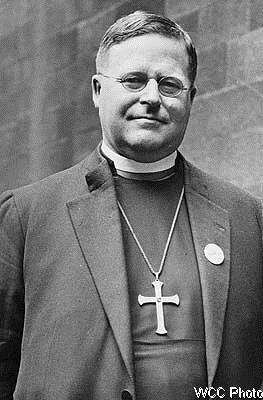By Marianne Allison
Today is All Saints’ Day, a day when the church celebrates all the folks who came before who lived lives worthy of emulation and inspiration. We don’t just celebrate those people who have “officially” been made saints—the ones who have been canonized historically and who are referred to as “St. John,” or “St. Paul.” We celebrate the famous and unknown people who toiled in service to others and to God.
It’s a good time then, to consider William Temple (15 October 1881 – 26 October 1944), the man for whom William Temple House is named and a towering influence on social justice in the church and in the world. A bishop, reformer and theologian, Temple was Archbishop of Canterbury between 1942-44, and he fundamentally shifted the way England looked at the welfare of its citizens. His major contribution was a perspective on how Christian social ethics and principles should inform Christians’ social action and reflection, including pressing their government to provide decent, affordable housing, education for all children, and a voice in their workplaces.[i] Temple’s social philosophy was deeply embedded in his faith, and it was a theology of Christ in the world. He once wrote, “It is a mistake to think that God is only, or even chiefly, concerned with religion.” Likewise, he called for Christians to be taking action in the world, in God’s name, not merely worshipping that name within the church.[ii]
As the son of the Archbishop of Canterbury, he was, as they say, “born into the purple”—the upper echelons of late Victorian aristocracy. This was a time when England was still sending the poor and destitute to workhouses: involuntary and prison-like institutions where families were separated people of all ages required to work for their keep. Temple was educated at Oxford and distinguished himself in classics. Nevertheless, his interest in the poor was kindled by a professor who encouraged his students to live in the London slums during their vacation. He became involved in the Worker’s Educational Association in 1908, serving as president until 1924, and joined the Labour Party (others in his echelon would have been most decidedly Tory.) Even before he was as a priest in 1909, he was critical of the church’s disengagement with the poor and marginalized: “We have to teach St. James’ doctrine,” he said, “that anyone who is not interested in ‘good works’ is in effect anti-Christ.”
Gregarious and humble, he didn’t take on airs, and youth flocked to him. In a series of lectures at Oxford in 1931, he challenged youth to follow Christ in the world, engaging in bettering the world and lifting up those who suffered. He later articulated a series of seven social principles that he saw as God’s will for the world: decent, affordable housing; education for all children until years of maturity; a secure and sustainable income for all citizens; a voice for every worker in the conduct of their workplace; sufficient daily and weekly leisure, as well as annual vacations; and freedom of worship, assembly, and association.
When William Temple House was formed in 1965, it was in the midst of the “Great Society” discussion in the United States, a time of optimistic visions of the government’s role in lifting up the poorest in this country. William Temple House founder Clarence Abbott, himself an Episcopal priest, no doubt saw in William Temple the marrying of faith and good works in helping to bring forth a society that reflected Jesus’ love and concern for the poor and meek. And so Abbot named his project after the man who said, “the preoccupation of the church should be with those outside it.”
Although no longer a part of the Episcopal Church proper, the philosophy of social action flowing from love and service still permeates this place. We are still standing on the shoulders of those saints, like Temple and Clarence Abbott, who came before us.
[i] Marsden, John, “William Temple: Christianity and the Life of Fellowship.” In Political Theology, 8.2 (2007), 213-223.
[ii] New World Encyclopedia http://www.newworldencyclopedia.org/entry/William_Temple

